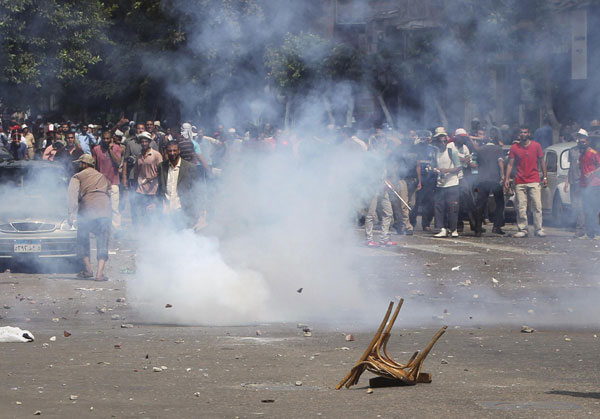Egypt's rival sides upset with new governors
 |
|
A chair is seen on the ground as supporters of ousted Egyptian President Mohamed Mursi move back from tear gas thrown by police during clashes in central Cairo August 13, 2013. Supporters and opponents of Mursi battled in downtown Cairo's streets on Tuesday, hurling rocks at each other as police fired volleys of tear gas. [Photo/Agencies] |
The activist group known as the April 6 Youth Movement - which helped mobilize street protests against both Mubarak and Morsi - rejected the shake-up, saying it brought back "old faces that contributed to the corruption of political life before the revolution." It called it a "failure" of the interim government and warned against moving away from the goals of the uprising that toppled Mubarak.
"Rectify these mistakes before it's too late as we will not stand idly," the group said in a statement.
One of the new deputy governors, Sami Sedhom, oversaw police forces in Cairo during deadly crackdowns on protesters in late 2011 that killed more than 50 people. The incidents, known as the "Mohammed Mahmoud Battle", were key in forcing military rulers who took over after Mubarak to put in place a timeline for elections that led to civilian rule.
Tuesday's appointments saw several military generals given governorships of border provinces, in line with tradition. Five more are now in charge of other key governorates, including in the Mediterranean city of Alexandria, Egypt's second largest city where clashes between pro and anti-Morsi protesters have turned violent. Three others hold Suez Canal governorates, including Port Said, Ismailia and Suez. The fifth was given the ancient city of Luxor, a prized tourist destination.
Two governorship posts were left open after it was reported that the nominees declined.
Shortly before mass protests that led to his ouster, Morsi had appointed 17 new governors in a move that critics said was aimed at solidifying Islamist power. The appointments bolstered the Brotherhood's already entrenched grip on the executive and legislative branches at the time. The new appointments Tuesday replaced 20 governors.
The ex-president's supporters have ramped up their protests in the past two days after news leaked of security plans to besiege their Cairo protest camps. Security officials say police delayed the action to avoid bloodshed after protests swelled.
Authorities, meanwhile, extended the detention of more than 100 pro-Morsi protesters previously detained in various clashes.
Among the key demands of protesters is the release top Brotherhood leaders charged with inciting violence.
Also Tuesday, a Cairo court said it would begin hearings on September 7 for former Brotherhood lawmaker Mohammed el-Beltagy and three others for their alleged role in the abduction and beating of a policeman. El-Beltagy is also among those wanted by police for allegedly inciting violence, but has taken refuge among thousands of protesters at the main Cairo sit-in, beyond the reach of police.
- Egypt police to besiege sit-ins within 24 hours
- Egypt expected to act against pro-Mursi protesters
- Morsi supporters dig in as Egypt talks stall
- Egypt news agency confirms envoys met Shater
- Egypt's rulers to move against Brotherhood vigils
- Egypt allows EU envoy to see deposed Morsi
- Egypt arrests two pro-Morsi party leaders
- Pro-military protesters hold mass rallies in Egypt
- Egypt's police deny using lethal weapons





















